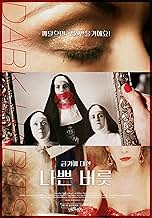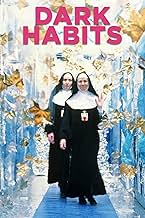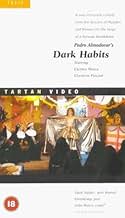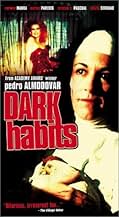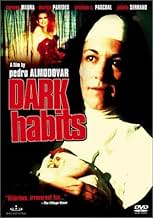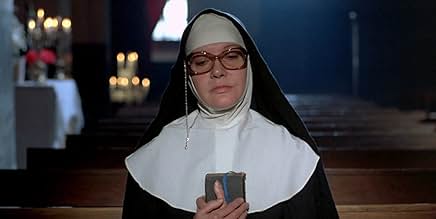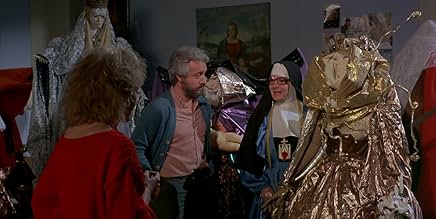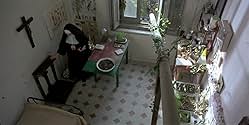IMDb RATING
6.5/10
8.9K
YOUR RATING
A nightclub singer seeks refuge with gay nuns on dope in a Madrid convent.A nightclub singer seeks refuge with gay nuns on dope in a Madrid convent.A nightclub singer seeks refuge with gay nuns on dope in a Madrid convent.
- Awards
- 1 win & 1 nomination total
Cristina Sánchez Pascual
- Yolanda
- (as Cristina S. Pascual)
Miguel Zúñiga
- Madero
- (as Miguel Zuñiga)
Mary Carrillo
- Marquesa
- (as Mari Carrillo)
Rubén Tobías
- Policía
- (as Ruben Tobias)
Concha Grégori
- Sofia
- (as Concha Gregori)
Ángel Sánchez Harguindey
- Periodista
- (as Angel S. Harguindey)
- Director
- Writer
- All cast & crew
- Production, box office & more at IMDbPro
Featured reviews
The very fact that you are going to watch nuns snorting cocaine, and even craving for it, should give you an idea of how far Almodovar went to give an alternative view of what a "convent" is in this movie. I watched it in the original language (Spanish)and found it brilliant and extremely entertaining, a very good concentrate of the "early" Almodovar, with His portrayal of a depraved 80's era in Madrid, and His usual intermingling of stories... Also, the viewer is seldom allowed to know what to expect next, and the whole atmosphere in the movie is just so unconventional... Definitely worth watching, hopefully it doesn't lose too much in English..
"Dark Habits" from 1983 was Pedro Almodovar's first film made with a decent producer, film company, and budget.
There are signs of his later brilliance in films like "Woman on the Verge of a Nervous Breakdown" and "All About My Mother," but even for the quirky Almodovar, this is one strange film.
"Sister Act" is vaguely reminiscent of this movie, only in the fact that "Dark Habits" concerns Yolanda, a nightclub performer (Cristina Sánchez Pascual) whose boyfriend (Will More) overdoses while she's in his apartment.
Yolanda panics, afraid she will be accused of killing him by the police, so, wearing her red sequined gown, she hides out in a Madrid convent.
This is unlike any convent depicted before or since. Some of the nuns, like Yolanda herself, are drug addicts, doing heroin and coke. One nun has a pet tiger. Another writes sexy novels under a pseudonym. Another nun designs fashions and is in love with the local priest.
The Mother Superior is a lesbian and falls in love with Yolanda. The nuns all have strange names, depicting that man is the lowest form of animal: Sister Snake, Sister Rat, etc.
The big problem at the convent at the moment is that the Marquesa (Mary Carillo), now that her generous husband is dead, has decided to withdraw patronage from the convent. One of the nuns gets information about the Marquesa's daughter and decides to blackmail her with it.
"Dark Habits," I believe, suggests the Movida Madrilenia, a hedonistic countercultural movement that took place in Madrid after the death of Franco.
It was meant to represent a new Spanish identity, an identity characterized by freedom of expression, use of recreational drugs, and even a new dialect.
It was a hedonistic culture that more or less destroyed itself by the overuse of heroin. At the end of the era, Madrid was left with drug addicts, dead junkies, people leaving Madrid for their original hometowns, and for others, rehabilitation and a useful life.
The convent serves as a microcosm of this movement. Here one sees art, drugs, music, and homosexuality.
A fascinating if sometimes uncomfortable film, and certainly not representative of the later Almodovar, who himself has distanced himself from this offbeat, dark film.
There are signs of his later brilliance in films like "Woman on the Verge of a Nervous Breakdown" and "All About My Mother," but even for the quirky Almodovar, this is one strange film.
"Sister Act" is vaguely reminiscent of this movie, only in the fact that "Dark Habits" concerns Yolanda, a nightclub performer (Cristina Sánchez Pascual) whose boyfriend (Will More) overdoses while she's in his apartment.
Yolanda panics, afraid she will be accused of killing him by the police, so, wearing her red sequined gown, she hides out in a Madrid convent.
This is unlike any convent depicted before or since. Some of the nuns, like Yolanda herself, are drug addicts, doing heroin and coke. One nun has a pet tiger. Another writes sexy novels under a pseudonym. Another nun designs fashions and is in love with the local priest.
The Mother Superior is a lesbian and falls in love with Yolanda. The nuns all have strange names, depicting that man is the lowest form of animal: Sister Snake, Sister Rat, etc.
The big problem at the convent at the moment is that the Marquesa (Mary Carillo), now that her generous husband is dead, has decided to withdraw patronage from the convent. One of the nuns gets information about the Marquesa's daughter and decides to blackmail her with it.
"Dark Habits," I believe, suggests the Movida Madrilenia, a hedonistic countercultural movement that took place in Madrid after the death of Franco.
It was meant to represent a new Spanish identity, an identity characterized by freedom of expression, use of recreational drugs, and even a new dialect.
It was a hedonistic culture that more or less destroyed itself by the overuse of heroin. At the end of the era, Madrid was left with drug addicts, dead junkies, people leaving Madrid for their original hometowns, and for others, rehabilitation and a useful life.
The convent serves as a microcosm of this movement. Here one sees art, drugs, music, and homosexuality.
A fascinating if sometimes uncomfortable film, and certainly not representative of the later Almodovar, who himself has distanced himself from this offbeat, dark film.
Maybe the one line summary is wrong, that's the problem with Pedro Almodovar's flick, you don't know what its supposed to be: ironic, satire, parody, black comedy or a serious drama. It's got a lounge singer hiding out in a convent (remember this is a 1983 movie, made way before Sister Act) after her lover ODs. The nuns are former losers, street trash, etc. who are given punishable names like Sister Rat-in-the-Sewer or Sister-Damned and their Mother Superior shoots up heroin. Are they making fun of Catholics or what? Nevertheless, this is a bit funny, while being a little boring. Recommended to the Almodovar/Spanish/foreign fans who shouldn't expect this one to be better than his usual films.
This film made after Almodovar's first more upbeat outrageous films, is a film that tells of the end of the Movida Madrilenia, a movement existing in the early eighties in Madrid that was defined by a mixture of new romantic punk and pop, and the ironic use of Spanish folklore and the 'housewife' culture. When people in this subculture started to commonly use heroine, the downfall of the movement had begun. This film is about the choices that people had to make at the end of this era. some stayed junkies, others died, some went back to the small towns where they had moved from, others went on to give up on drugs and become more constructive. The convent where the nuns reside can be interpreted as the habitation of this irreverent movement, frequented by police searches, dealers, artists, and junkies. The movie has some great musical moments which indicate that Almodovar might one day take his hand to this genre. The religious element interwtined with (homo)sexuality will certainly be proliferated again in the forthcoming movie La Mala Educacion. The movie also contains a cameo of a Spanish 'Harrold Robbins' type of writer, who is featured sitting at one of the tables wiping her mouth with a handkerchief as Yolanda sings in a night club at the beginning of the movie. This authopr refers to the character of sister Rata de Callejon, who has a secret career as trashy novel writer. The film is somewhat darker than most of Almodovar's early movies, but is very gentle, provides enough comedy and the characters above all remain very human, all of them have their virtues and vices.
This is early Almodovar, and if you've seen his other early films, you know what to expect. If you haven't seen them, then you might be surprised. The film is funny, unpredictable, and endearing in a kinky, warped kind of way. Almodovar's nuns are wonderful characters. With straight faces and looks of piety, they do outrageous things without batting an eye. There are probably many ways to interpret the film, but I think it's about acceptance. We're all "sinners" in one way or another, as the nuns would say, and it's not up to us to judge or condemn other people. The sisters are very forgiving - in fact, they love sinners! - and they create a little haven where marginal people can find shelter. They are eccentric, they do things that mainstream society condemns, but they don't really do any harm to anyone and maybe even help some people find their path in life. This isn't the Catholic Church's idea of what a convent should be like, and I understand that very devout people would be offended by the way Almodóvar treats the subject. Still, he does it in a kind of gentle, good humored way and he offers an alternative vision of religious devotion that can make you laugh if you aren't too uptight about these things. Things don't always make sense, but that's fine, things don't make sense in life sometimes, either. Just sit back and watch, and enjoy the twists and turns.
Did you know
- TriviaPedro Almodóvar's first film to have a proper producer and be made for a proper film company, rather than be made on the hoof like his previous projects. Almodóvar has since distanced himself from the film as he felt that he had to bow to commercial considerations.
- GoofsThe "Salí porque salí" song is obviously not sung by Yolanda nor the backing vocalists.
- ConnectionsReferenced in El Coleta & Jarfaiter: El Piko 3 (2014)
- SoundtracksSalí porque salí
Written by J. Curiel Alonso
Arranged by Miguel Morales
Performed by Sol Pilas
Edited by Música Latina N.Y. (USA)
- How long is Dark Habits?Powered by Alexa
Details
- Release date
- Country of origin
- Language
- Also known as
- Entre tinieblas
- Filming locations
- Production company
- See more company credits at IMDbPro
- Runtime1 hour 54 minutes
- Sound mix
- Aspect ratio
- 1.66 : 1
Contribute to this page
Suggest an edit or add missing content


![Watch Tráiler [VO]](https://m.media-amazon.com/images/M/MV5BZTI5ZGZmNGEtZmM0Mi00ZmUxLWI0ZGMtMmZmODQ0NDQzMTY5XkEyXkFqcGdeQXRyYW5zY29kZS13b3JrZmxvdw@@._V1_QL75_UX500_CR0)
